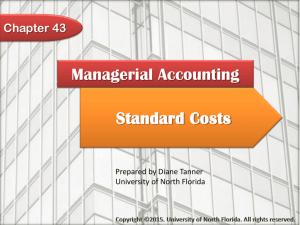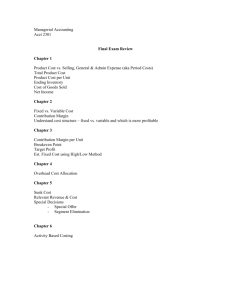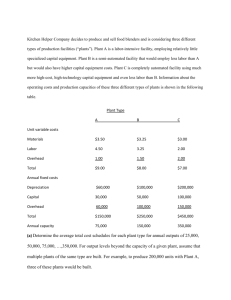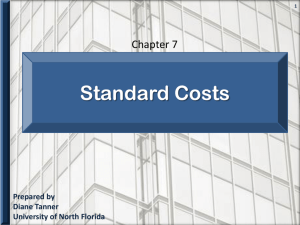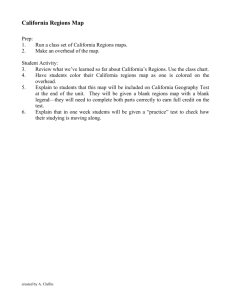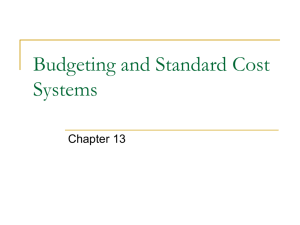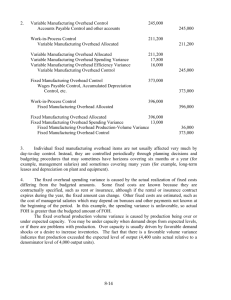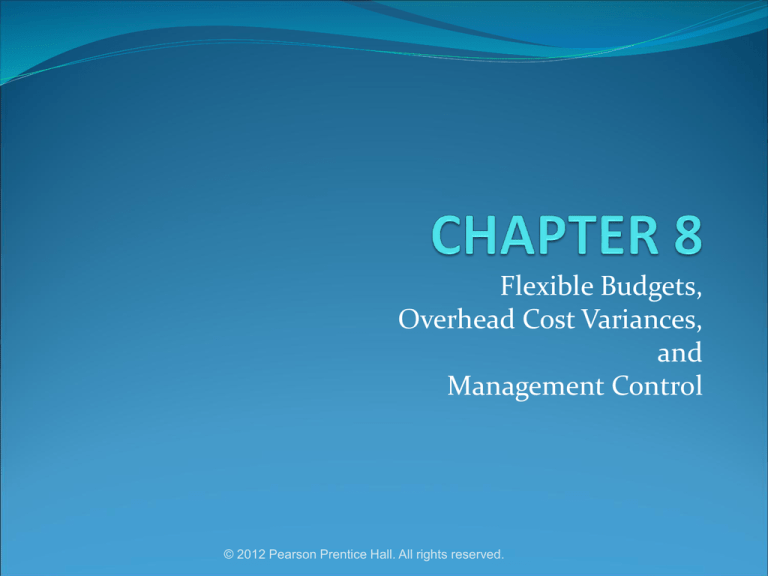
Flexible Budgets,
Overhead Cost Variances,
and
Management Control
© 2012 Pearson Prentice Hall. All rights reserved.
Planning and Overhead
Variable overhead—as efficiently as possible, plan only
essential activities
Fixed overhead—as efficiently as possible, plan only
essential activities, especially because fixed costs are
predetermined well before the budget period begins
© 2012 Pearson Prentice Hall. All rights reserved.
Standard Costing
Traces direct costs to output by multiplying the
standard prices or rate by the standard quantities of
inputs allowed for actual outputs produced
Allocates overhead costs on the basis of the standard
overhead-cost rates times the standard quantities of
the allocation bases allowed for the actual outputs
produced
© 2012 Pearson Prentice Hall. All rights reserved.
A Roadmap: Variable Overhead
Actual Costs
Incurred:
Actual Input
X
Actual Rate
Actual Inputs
X
Budgeted Rate
Spending
Variance
Flexible Budget:
Budgeted Input
Allowed for
Actual Output
X
Budgeted Rate
Efficiency
Variance
Flexible-Budget
Variance
Total Variable Overhead Variance
Over/Under Allocated Variable Overhead
© 2012 Pearson Prentice Hall. All rights reserved.
Allocated:
Budgeted
Input Allowed for
Actual Output
X
Budgeted Rate
Never a
Variance
Never a
Variance
A Roadmap: Fixed Overhead
Actual Costs
Incurred
Same Budgeted
Lump Sum
(as in Static
Budget)
Regardless of
Output Level
Spending
Variance
Flexible Budget:
Same Budgeted
Lump Sum (as in
Static Budget)
Regardless of
Output Level
Never a
Variance
Flexible-Budget
Variance
Total Fixed Overhead Variance
Over/Under Allocated Fixed Overhead
© 2012 Pearson Prentice Hall. All rights reserved.
Allocated:
Budgeted
Input Allowed for
Actual Output
X
Budgeted Rate
ProductionVolume
Variance
ProductionVolume
Variance
Overhead Variances
Overhead is the most difficult cost to manage, and is
the least understood.
Overhead variances involve taking differences between
equations as the analysis moves back and forth
between actual results and budgeted amounts.
© 2012 Pearson Prentice Hall. All rights reserved.
Developing Budgeted Variable Overhead
Cost Rates
Choose the period to be used for the budget.
Select the cost-allocation bases to use in allocating
variable overhead costs to output produced.
3. Identify the variable overhead costs associated
with each cost-allocation base.
4. Compute the rate per unit of each cost-allocation
base used to allocate variable overhead costs to
output produced.
1.
2.
© 2012 Pearson Prentice Hall. All rights reserved.
The Details: Variable OH Variances
Variable overhead flexible-budget variance
measures the difference between actual variable
overhead costs incurred and flexible-budget
variable overhead amounts.
Variable Overhead
flexible-budget variance
=
Actual Costs
Incurred
(c) 2012 Pearson Prentice Hall. All rights reserved.
-
Flexible-budget
amount
The Details: Variable OH Variances
Variable overhead efficiency variance is the
difference between actual quantity of the costallocation base used and budgeted quantity of the
cost per unit of the cost-allocation base.
Variable
Overhead
Efficiency
Variance
=
{
Actual quantity of
variable overhead
cost-allocation base
used for actual output
-
Budgeted quantity of
variable overhead costallocation based allowed
for actual output
(c) 2012 Pearson Prentice Hall. All rights reserved.
}X
Budgeted variable
overhead cost
per unit of
cost-allocation base
The Details: Variable OH Variances
Variable overhead spending variance is the
difference between actual and budgeted variable
overhead cost per unit of the cost-allocation base,
multiplied by actual quantity of variable overhead
cost-allocation base used for actual output.
Variable
Overhead
Spending
Variance
=
{
Actual variable
overhead cost
per unit of
cost-allocation base
-
Budgeted variable
overhead cost
per unit of
cost-allocation base
(c) 2012 Pearson Prentice Hall. All rights reserved.
}X
Actual quantity of
variable overhead
cost-allocation base
used for actual output
Developing Budgeted Fixed Overhead Cost
Rates
Choose the period to be used for the budget.
Select the cost-allocation bases to use in allocating
fixed overhead costs to output produced.
3. Identify the fixed overhead costs associated with
each cost-allocation base.
4. Compute the rate per unit of each cost-allocation
base used to allocate fixed overhead costs to
output produced.
1.
2.
© 2012 Pearson Prentice Hall. All rights reserved.
The Details: Fixed OH Variances
Fixed overhead flexible-budget variance is the
difference between actual fixed overhead costs and
fixed overhead costs in the flexible budget.
This is the same amount for the fixed overhead
spending variance.
Fixed Overhead
flexible-budget variance
=
Actual Costs
Incurred
-
(c) 2012 Pearson Prentice Hall. All rights reserved.
Flexible-budget
amount
The Details: Fixed OH Variances
Production-volume variance is the difference between
budgeted fixed overhead and fixed overhead allocated
on the basis of actual output produced.
This variance is also known as the denominator-level
variance or the output-level overhead variance.
Production-Volume
Variance
=
Budgeted
Fixed Overhead
-
Fixed Overhead allocated using
budgeted input allowed for
actual output units produced
(c) 2012 Pearson Prentice Hall. All rights reserved.
Production-Volume Variance
Interpretation of this variance is difficult due to the nature
of the costs involved and how they are budgeted.
Fixed costs are by definition somewhat inflexible. While
market conditions may cause production to flex up or
down, the associated fixed costs remain the same.
Fixed costs may be set years in advance, and may be
difficult to change quickly.
Contradiction: Despite this, examination of the fixed
overhead budget formulae reveals that it is budgeted
similar to a variable cost.
© 2012 Pearson Prentice Hall. All rights reserved.
Variable Overhead
Variance Analysis Illustrated
© 2012 Pearson Prentice Hall. All rights reserved.
Fixed Overhead
Variance Analysis Illustrated
© 2012 Pearson Prentice Hall. All rights reserved.
Production-Volume Variance
© 2012 Pearson Prentice Hall. All rights reserved.
Integrated
Variance
Analysis
Illustrated
© 2012 Pearson Prentice Hall. All rights reserved.
© 2012 Pearson Prentice Hall. All rights reserved.

